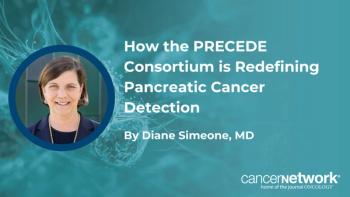
Quality of Life Improves Over Time for Patients With Aggressive Lymphomas
Patients with aggressive lymphomas had a sharp increase in quality of life from time of diagnosis until 1 year later.
Patients with aggressive lymphoma tended to have major improvements in quality of life (QOL) after 1 year, compared to baseline QOL at diagnosis. Then, QOL increases continued upward for years to come, according to research presented at the 62nd ASH Annual Meeting and Exposition.
Researchers used the Functional Assessment of Cancer Therapy-General (FACT-G) – which includes well-being, physical, functional, social/family, and emotional factors – to analyze QOL in 2,018 patients with newly diagnosed aggressive lymphoma.
“The scale itself is a 27-item questionnaire measuring each of the 4 domains, which are compounded to create an overall quality of life score. A higher score indicates a better-rated quality of life,” Robert M. Kraft, MD, study author and internal medical resident at the Mayo Clinic, said in his presentation.
The patients were followed up at 1, 2, 3, 6, and 9 years after diagnosis.
On average, patients saw the sharpest increase in QOL 1 year after diagnosis. QOL then continued to improve for most patients up until the 9-year mark.
The researchers also compared each of the FACT-G domains between the group of patients with aggressive lymphomas to the general population in the United States. Emotional and functional, and physical wellbeing did not have statistically significant differences at baseline between the patient and general populations.
Social and family wellbeing, however, had a marked difference at baseline.
“The most striking sub-domain baseline finding was social/family wellbeing in patients with aggressive lymphoma,” Kraft said. “[It] was clinically significantly higher than the US general population at baseline.”
Kraft also explained that social/family wellbeing scores saw a mild decrease from baseline until the 9-year mark, though it wasn’t a large enough decrease to be considered statistically significant.
“A lymphoma diagnosis is a life-changing diagnosis – any cancer diagnosis is – and there’s a sense of rallying behind the patient,” Kraft said. “We presume that is what was shown in the results. Then, in getting at that mild decline over time … treatment can change a patient’s outlook on things, and [cancer] can stress out family members as well.”
Ultimately, though, Kraft emphasized that despite the diagnosis, life does get better over time for patients with aggressive lymphomas.
“Compounding all the scores together, there was no clinically meaningful difference in quality-of-life scores at baseline in patients with aggressive lymphomas [compared] to the US general population,” Kraft said. “However, in patients with aggressive lymphoma … total quality of life scores 9 years after diagnosis were clinically significantly higher than the US general population.”
Reference:
Kraft RM, Larson MC, Yost KJ, et al. Quality of life after diagnosis in survivors of aggressive lymphomas. Presented at: 62nd ASH Annual Meeting and Exposition; December 6, 2020. Abstract 371.
Newsletter
Stay up to date on recent advances in the multidisciplinary approach to cancer.





































